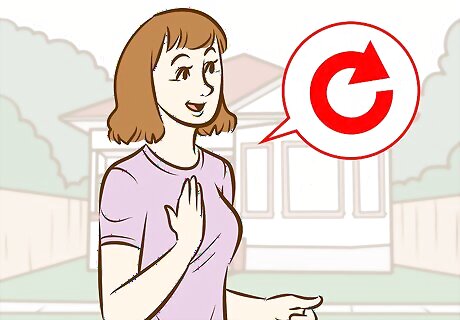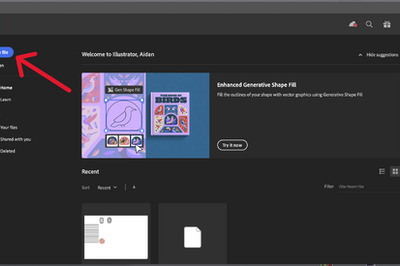
views
How to Learn the Style

Understand the process. "Gibberish" is an umbrella term for any nonsensical language that is hard to understand, such as baby talk. However, all established variants use the same pattern: A nonsense sound is inserted into every syllable when speaking. The same nonsense sound is used over and over, so words get much longer and all sound quite similar. Pig Latin is a pseudo-language that is another way of speaking in code. It's a little more common and a little easier to deduce.

Break a word down into spoken syllables. Generally, every syllable in a word contains one vowel sound. Here are some words and their syllables: Tree: Tree Bottle: Bot / tle (pronounced tul) Symmetry: Sym (sim) / me (meh) / try (tree)

Add "-idig-" before each vowel sound in a syllable. If there are only vowels (e.g., "I"), add it at the very beginning. Regardless of whether there are 1,2, or 3 consonants at the beginning, add it before the first vowel sound. The result will sound something like this: tree: tridigee bottle: bidigottle symmetry: symm"idig"etry For a word like "street," remember to keep the consonants together (it's still one syllable). The word, in gibberish, would be pronounced, "stridigeet."

Resist the urge to repeat vowel sounds. If you were to say the word "hi" in gibberish, it may be tempting to pronounce it "hi-tho-gi," instead of "hI-di-gi." which sounds like you're saying "hit a guy." Don't do it! It's harder to decipher when you add in a different vowel sound. "My name" is not "mi-thag-eye nay-tha-game," it's "mI-dig-eye nI-dig-ame." "-idig-" has the same initial sound as "dig" (not "pig"), in case you were curious. In the IPA, it's a schwa, or /ə/. Think of a caveman grunt.
How to Get Fluent

As you're just walking around, mutter different words to yourself. If you have trouble, slow down and say them syllable by syllable, and just repeat until you can say it quickly. Do the same thing with phrases. Start simple at first. Practice "the cat sat on the mat (with a hat.)" It's very helpful in practicing to start speaking really fast. Again, you probably shouldn't mutter words to yourself in public settings with other people around; they might think you are possessed by a demon. However, if this isn't a problem, go right ahead.

Teaching this to your friends or S.O. is helpful especially in a situation with kids. You can talk about if you want to get ice cream, or go to a movie or buy a present with the kid nearby without them getting all hyper. You could also use this with friends to talk about things that are urgent but not really PG-13.

Repeat, repeat, repeat. Eventually, it'll seem like othagold hothagat. You'll grow more and more confident, shortly moving onto phrases and sentences. Take a look around your room. What objects do you see? Is there a chothagair? Maybe a bothaged? Or a cothagompothagutothager? How quickly can you decipher the words in this secret language? What sounds are flubbing you up?

Get quicker. After a bit of practice, the words will start rolling off your tongue. Try reading aloud the words on this page in gibberish. How quickly can you translate? Are you ready for sentences? "My name is": Mothagy nothagame othagis [yothagour nothagame hothagere] "How are you today?": Hothagow othagare yothagou tothagodothagay? "Yes, I can speak gibberish, how could you tell?": Yothages, othagi cothagan spothageak Gothagibbothagerothagish, hothagow cothagould yothagou tothagell?"

Experiment with different variations. There are many established variants, and you're completely welcome to come up with your own twist -- though no one else will understand you. When it comes to that inserted sound, here are some possible (already established) variants: "-idig-": "Go" becomes "gidigo." "-uddag-": "Go" becomes "guddago." "-uvug-": "Go" becomes "guvugo." "-othag-": "Go" becomes gothago." "-Othag-" is the hardest to say quickly of this list ("th" and "g" are farther apart in the mouth than "d" and "g" or "v" and "g" and thus take a split-second longer to pronounce). Once you get fast at "-othag-", the rest will be cake (cothagake!).

Practice! Get out a few old baby books and read them out loud in gibberish. Keeping the three syllable words to a minimum (how did you do with Gothagibbothagerothagish above?) is key. Once the baby books are easy, it's time to impress your friends! Hopefully you can convince a buddy to do this with you. What's the point in speaking in code if you can't exchange classified information in front of people? Or, it's possible you have friends that can already do this and you just don't know. Sothago othagask!

Use your powers wisely. Now that you can say whatever you please in front of anyone, don't abuse your power. After a few phrases, you're going to be like that guy who has a French word for everything. People may get irritated, especially if you don't tell them what the heck is going on. If you'd like, you could teach them your ways, but it may be more fun to see if they can figure it out first. Hold off until you're confident with it. Speaking gibberish can be quite impressive if you can do it decisively and with confidence. Just as with any language, you have to practice it often. Or else you'll find yourself tongue-tied and stuttering.



















Comments
0 comment